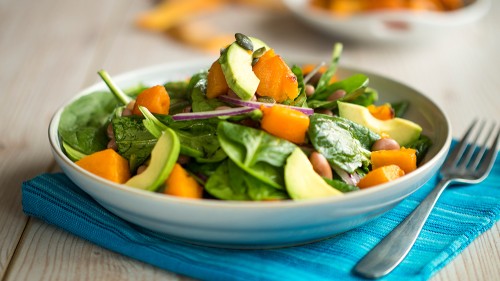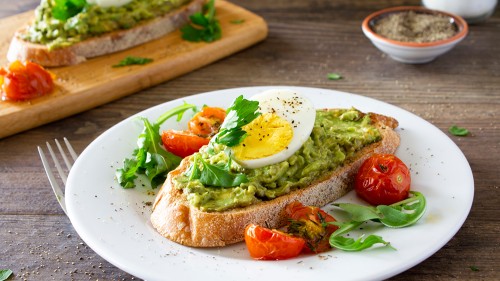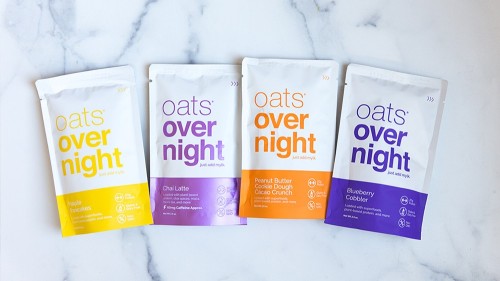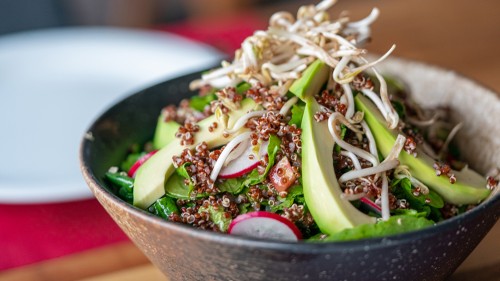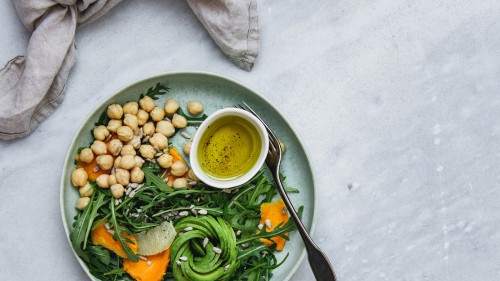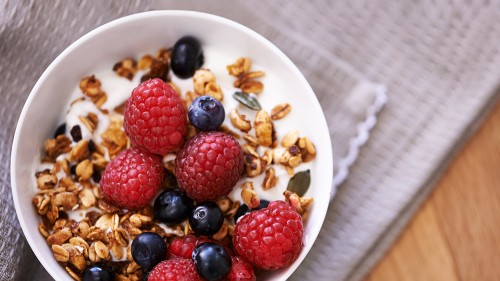Top Health Benefits of Oats and Oatmeal, Plus Tips to Prep It in a Healthy Way
Published on June 7, 2022
Medically Reviewed by Natalie Olsen, MS, RDN
Oatmeal is a versatile food that has many health benefits. It can help support gut health, weight management, blood sugar control, and more. It is important to use healthy ingredients when preparing oatmeal to achieve the most health benefits.

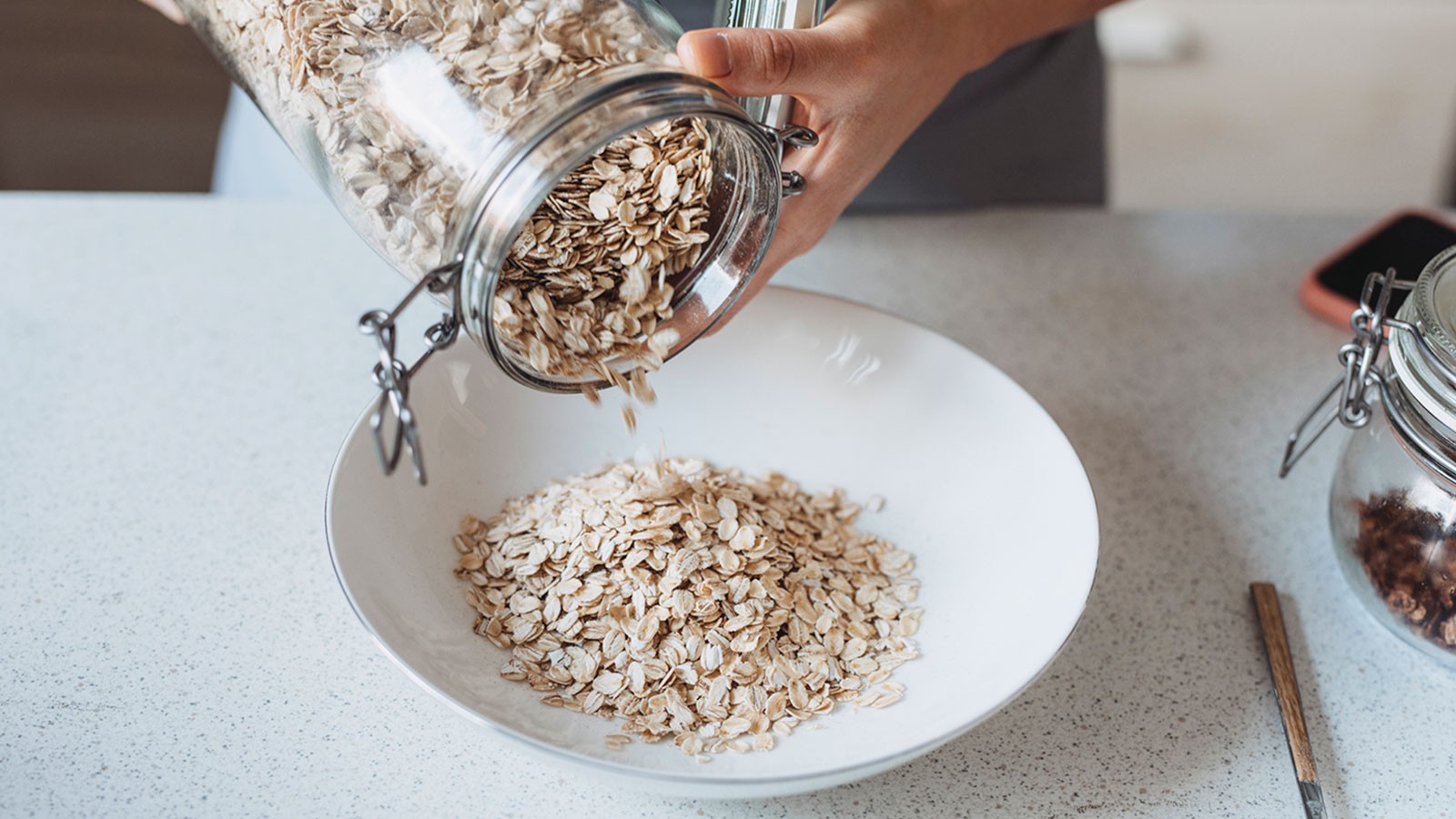
Oatmeal is a very common breakfast food in America.
Some people view oatmeal as plain or ordinary. However, even though oatmeal is a healthy food on its own, it provides a versatile base to create endless flavors.
Keep reading to learn more about what oatmeal is, oatmeal nutrition, the benefits of oatmeal, and ways to enjoy oatmeal.
What Is Oatmeal?
Oatmeal is the name given to a type of hot cereal made out of oats. Oats come from the seeds of oat grass, which is a type of plant similar to wheat. (1)
Like wheat, oats are a type of whole grain.
Unlike wheat, oats do not contain gluten on their own. This makes them a good grain option for people who have celiac disease or who follow a gluten-free diet for other reasons.
However, oats are commonly cross-contaminated with gluten in the manufacturing process. This is why it is important to only choose certified gluten-free oats if you are someone who needs to avoid gluten.
Oats can come in different forms. Rolled oats and steel-cut oats are two common forms sold in stores.
- Steel Cut Oats: Steel cut oats are slightly less processed than rolled oats. They have a coarser, chewier texture than rolled oats. The downside is that they take longer to cook.
- Rolled Oats: Rolled oats are steamed and flattened. They have a soft texture and can cook in just a few minutes.
- Quick Oats: You may also see something called “quick oats” in the grocery store. These are a form of rolled oats that have been processed a little further to reduce cooking time even more. Instant oatmeal is a type of quick oats.
Summary
Oatmeal is made from oats that come from oat grass. They are naturally gluten-free. Steel cut and rolled oats are two common forms of oats.
Is Oatmeal Good for You?
On its own, oatmeal is very nutritious.
A 1-cup serving of cooked oatmeal (from 1/2 cup dry rolled oats) provides the following nutrition profile: (2)
- Calories: 166
- Protein: 6 g
- Fat: 3.5 g
- Carbs: 28 g
- Fiber: 4 g
- Sugar: 1 g
- Sodium: 9 mg
- Iron: 2.1 mg (12% daily value)
- Magnesium: 63 mg (15% daily value)
- Phosphorus: 180 mg (14% daily value)
- Thiamine: 0.2 mg (15% daily value)
- Zinc: 2.3 mg (21% daily value)
- Manganese: 1.4 mg (59% daily value)
- Selenium: 12.6 mcg (23% daily value)
Summary
Oatmeal is a good source of fiber and plant-based protein. It is also a good source of vitamins and minerals like iron, magnesium, selenium, and zinc.
Health Benefits of Oatmeal
Oats that are used to make oatmeal have many health benefits. Health benefits of oatmeal include:
Supports Heart Health
Some of the fiber in oatmeal is called beta-glucan fiber. Beta-glucan fiber has been shown by research to help lower cholesterol levels. (3)
This can help protect against heart disease.
Fiber also helps lower blood pressure. (4)
A large review of many studies found that people who eat the most fiber have a significantly lower risk of developing heart disease.
For people who already have heart disease, fiber can help reduce their risk of death as a result of it. (5)
Can Help Balance Blood Sugar Levels
The fiber in oatmeal helps support normal blood sugar levels. It does this by helping to slow down how much your blood sugar rises after eating carbohydrates. (6)
Eating a high-fiber food like oatmeal would not raise the blood sugar as much as eating lower-fiber food. This is true even if the foods have the same amount of carbohydrates.
This health benefit makes oatmeal a great choice for people who are at risk for or already have, any form of diabetes. Blood sugar control is also important for the general population, though.
According to the Centers for Disease Control (CDC), many other conditions can develop from poorly controlled blood sugar levels. These include kidney and heart disease, nerve damage, and vision loss. (7)
Helps Support Weight Management
Most of the fiber in oatmeal is soluble fiber. Fiber is a type of carbohydrate that is not able to be digested.
Foods that are high in fiber take a longer time to leave the stomach. This helps control hunger levels and causes you to feel full for longer.
The fiber in oats has been specifically studied and found to help manage appetite. (8)
This can lead to eating less calories, which can help with weight management.
Dig Deeper: Best Foods for Weight Loss
Supports Gut Health
Oats act as a prebiotic. (9)
Prebiotics are a type of fuel for probiotics, which are a type of live, beneficial bacteria. (10)
Your body needs prebiotics in order for probiotics to do their job best.
The combination of prebiotics and probiotics helps promote a healthy digestive tract. It does this by balancing out the bacteria in your microbiome, or the microorganisms in your gut. (11)
The fiber in oatmeal can also help protect against or manage bowel disorders, such as irritable bowel disorder (IBS).
Fiber helps you pass bowel movements more easily and frequently. It can help manage both diarrhea and constipation. (12)
However, people who do not currently eat a lot of fiber should increase their intake gradually. Suddenly eating a lot of fiber can cause negative digestive symptoms, such as bloating and gas.
Drinking enough water is also very important when increasing fiber intake.
Provides a Source of Antioxidants
Oats are a less-commonly known source of antioxidants in the diet. (13)
Antioxidants support and protect your cells from damage. They do this by fighting off free radicals. Free radicals are unstable molecules that can build up in cells and cause harm to other molecules.
Antioxidants from foods like oats can therefore help protect against and manage a variety of diseases. (14)
May Help Protect Against Some Forms of Cancer
Although the protective effect was found to be weak, a review of seven studies found that eating oats is linked to a reduced risk of some cancers. (15)
The types of cancers included breast, endometrial, prostate, colorectal, and pancreatic.
The American Cancer Society also reports that fiber lowers the risk of some types of cancer. (16)
Summary
The oats used to make oatmeal have many health benefits. These include helping support blood sugar control, supporting heart health, helping create a healthy digestive tract, helping manage weight, protecting against some diseases, and protecting against some types of cancer.
Is Instant Oatmeal Good for You?
Instant oatmeal is a type of quick oats. They are more processed than rolled or steel-cut oats and typically come in individual packets.
They often have other ingredients added to them, such as added sugar, artificial flavorings, milk powders, salt, and other preservatives.
Whether instant oatmeal is good for you depends on the type.
Plain instant oatmeal that has no added sugar can provide similar benefits that other oats do. However, instant oatmeal with added sugar, artificial flavorings, and preservatives is not as good for you.
Summary
Plain instant oatmeal can still provide some health benefits similar to other oats. Instant oatmeal with added sugar, artificial flavors, and preservatives is not as healthy of an option.
Ways to Enjoy Oatmeal
Oatmeal doesn’t have to be a plain or boring breakfast option. Oatmeal provides a versatile base for an endless combination of meals. It can be made both savory and sweet, and you can enjoy oatmeal at any time of the day.
Cooking Oatmeal
Oatmeal can be cooked in a variety of ways. These include on the stovetop, in the microwave, or in a slow cooker or pressure cooker.
The microwave will provide a quicker option. The stovetop allows the option to cook larger batches of oatmeal, and to add more ingredients.
All types of oats need liquid to be cooked and turned into oatmeal. The basic ratio for cooking oatmeal is to use twice as much liquid as you have oats.
For example, if cooking 1/2 cup of rolled oats, use 1 cup of liquid. Water and milk of any kind are the most common liquids to cook oats in.
The time it takes to cook oatmeal depends on the type of oats you are using and the temperature they are being cooked at. It is a good idea to read the instructions from the package of oats to confirm the cooking time.
Healthy Ideas
Like other healthy foods, oatmeal can be made less healthy depending on how it is prepared. This is why it is important to prepare oatmeal with healthy ingredients to obtain the most health benefits.
Here are some ideas for enjoying oatmeal:
- Combine oats with chia or flaxseeds before cooking. After the oatmeal is cooked, stir in your favorite nut butter. Top with fresh or frozen berries.
- Stir in a diced apple to cooked oatmeal and sprinkle with cinnamon. Drizzle with almond or peanut butter. Sweeten it with a small amount of maple syrup or honey as desired.
- Make overnight oatmeal by adding oats with your desired type of milk to a bowl or jar with a lid. Mix in any of your favorite additions such as fruit, nuts, etc. Leave it in the refrigerator overnight. The next day, simply heat the oatmeal up in the microwave, or enjoy it cold.
- Enjoy savory oatmeal. Combine cooked plain oatmeal with a side of eggs and cooked vegetables. Season with a small amount of soy sauce, nutritional yeast, or other favorite seasonings. Top with sliced avocado if desired.
- Make baked oatmeal. Instead of making oatmeal in a bowl, you can make a large batch in the oven. There are many baked oatmeal recipes online. Just choose one without much added sugar. Baked oatmeal is a great choice when serving a larger crowd or when leftovers are desired.
Aside from oatmeal, you can get the benefits of oats in many other ways. Oats can be used in hundreds of other recipes. These include muffins, pancakes, quick bread, cookies, snack bars, and more.
Summary
Oatmeal is a versatile food that can be made into a wide variety of simple recipes. Preparing oatmeal with healthy ingredients helps you get the most health benefits. Overnight oats, savory oatmeal, and baked oatmeal are just a few ideas of how to enjoy oatmeal.
Frequently Asked Questions
Is it good to eat oatmeal every day?
There are no known risks of consuming oatmeal every day. Since it is such a versatile food, there are many ways to prepare it that can help keep you from getting bored of it.
Is oatmeal a good source of fiber?
Yes, oatmeal is a good source of fiber. A 1 cup serving of cooked oatmeal (from 1/2 cup dry rolled oats) provides 4 grams of fiber. This is about 16% of the daily value needs for women and 10% of the daily value for men.
Does oatmeal have protein?
Yes. A 1 cup serving of cooked oatmeal (from 1/2 cup dry rolled oats) provides about 6 grams of plant-based protein.
Is oatmeal a whole grain?
Yes. All forms of oatmeal are a source of whole grains. This makes them a good choice to help increase the amount of whole grains in your diet. The Dietary Guidelines for Americans recommends making at least half of the grains you eat whole grains. (17)
Is Quaker instant oatmeal good for you?
Quaker instant oatmeal is more processed than rolled or steel cut oats. However, it still has health benefits. When choosing instant oatmeal, it is best to select a plain flavor. This will have no added sugar, and you can then flavor it yourself.
The Bottom Line
Oatmeal can have many health benefits. Oats are a whole-grain food that provides important nutrients, such as fiber. Since they are naturally gluten-free, they can fit into most people’s diets.
Health benefits of oatmeal include:
- Supporting heart health.
- Helping to manage blood sugar.
- Providing a source of antioxidants.
Oatmeal can also:
- Help with weight management.
- Support gut health.
- Possibly protect against some types of cancer.
Some types of oatmeal can have a lot of added sugar and other ingredients in it. It is best to choose plain oatmeal and add your own ingredients and flavors.
You can also get the health benefits of oats by adding them to baked goods like muffins, pancakes, and quick breads.
At WellnessVerge, we only use reputable sources, including peer-reviewed medical journals and well-respected academic institutions.
- Oats | The Nutrition Source | Harvard T.H. Chan School of Public Health:
https://www.hsph.harvard.edu/nutritionsource/food-features/oats/ - Nutrition Facts for Cooked Oatmeal:
https://tools.myfooddata.com/nutrition-facts/173905/wt1/1 - β-glucans and cholesterol (Review) - PMC:
https://www.ncbi.nlm.nih.gov/pmc/articles/PMC5810204/ - Dietary fiber and blood pressure control - PubMed:
https://pubmed.ncbi.nlm.nih.gov/26923351/ - Dietary Fiber Is Beneficial for the Prevention of Cardiovascular Disease: An Umbrella Review of Meta-analyses - PMC:
https://www.ncbi.nlm.nih.gov/pmc/articles/PMC5731843/ - How Does Fiber Affect Glucose Levels? | Joslin Diabetes Center:
https://www.joslin.org/patient-care/diabetes-education/diabetes-learning-center/how-does-fiber-affect-glucose-levels - Manage Blood Sugar | Diabetes | CDC:
https://www.cdc.gov/diabetes/managing/manage-blood-sugar.html - Dietary fiber and satiety: the effects of oats on satiety - PMC:
https://www.ncbi.nlm.nih.gov/pmc/articles/PMC4757923/ - Different Oat Ingredients Stimulate Specific Microbial Metabolites in the Gut Microbiome of Three Human Individuals in Vitro - PMC:
https://www.ncbi.nlm.nih.gov/pmc/articles/PMC6217528/ - Prebiotics: Definition, Types, Sources, Mechanisms, and Clinical Applications - PMC:
https://www.ncbi.nlm.nih.gov/pmc/articles/PMC6463098/ - Prebiotics and Probiotics: Creating a Healthier You:
https://www.eatright.org/food/vitamins-and-supplements/nutrient-rich-foods/prebiotics-and-probiotics-creating-a-healthier-you - Fiber | The Nutrition Source | Harvard T.H. Chan School of Public Health:
https://www.hsph.harvard.edu/nutritionsource/carbohydrates/fiber/ - Nutritional advantages of oats and opportunities for its processing as value added foods - a review - PMC:
https://www.ncbi.nlm.nih.gov/pmc/articles/PMC4325078/ - Antioxidants | The Nutrition Source | Harvard T.H. Chan School of Public Health:
https://www.hsph.harvard.edu/nutritionsource/antioxidants/#the%20bottom%20line%20on%20antioxidants - Epidemiological studies of oats consumption and risk of cancer and overall mortality - PubMed:
https://pubmed.ncbi.nlm.nih.gov/25267240/ - Effects of Diet and Physical Activity on Risks for Certain Cancers:
https://www.cancer.org/healthy/eat-healthy-get-active/acs-guidelines-nutrition-physical-activity-cancer-prevention/diet-and-activity.html - Make Half Your Grains Whole Grains | MyPlate:
https://www.myplate.gov/tip-sheet/make-half-your-grains-whole-grains

